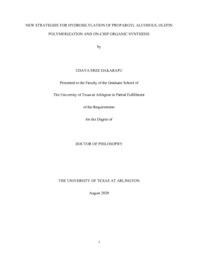
ATTENTION: The works hosted here are being migrated to a new repository that will consolidate resources, improve discoverability, and better show UTA's research impact on the global community. We will update authors as the migration progresses. Please see MavMatrix for more information.
Show simple item record
| dc.contributor.advisor | Jeon, Junha | |
| dc.creator | Dakarapu, Udaya sree | |
| dc.date.accessioned | 2022-08-24T15:15:40Z | |
| dc.date.available | 2022-08-24T15:15:40Z | |
| dc.date.created | 2020-08 | |
| dc.date.issued | 2020-08-11 | |
| dc.date.submitted | August 2020 | |
| dc.identifier.uri | http://hdl.handle.net/10106/30873 | |
| dc.description.abstract | The research described in this dissertation is on three different projects namely i) design and synthesis of traceless hydrosilyl acetal-directed, exo-syn hydrosilylation of propargyl alcohols to produce α-hydroxy (E)-vinylsilanes, ii) alkali metal lewis base-catalyzed, complexation-induced hydrogen atom transfer (LBCI-HAT) olefin polymerization and iii) on-chip organic synthesis enabled by engine-and-cargo on an electrowetting-on-dielectric digital microfluidic (EWOD) device. The first chapter is focused on the design and synthesis of traceless hydrosilyl acetal-directed, exo-syn hydrosilylation of propargyl alcohols to produce α-hydroxy (E)-vinylsilanes. Transition metal-catalyzed regioselective intramolecular hydrosilylation of propargylic alcohols utilizing easily accessible, inexpensive, and readily installable hydrosilyl acetals as a directing group to achieve high reactivity and high regioselectivity has been developed.In second chapter, focus is on alkali metal Lewis base-catalyzed, complexation-induced hydrogen atom transfer (LBCI-HAT) olefin polymerization. This strategy introduces transition metal-free, LBCI-HAT olefin polymerization process to the field of the production of large polymeric architectures. The approach is operationally simple, practical, and its sustainable nature of the (controlled) LBCI-HAT polymerization proceeds rapidly under aerobic conditions and at room temperature.In third chapter, focus is on on-chip organic synthesis using an electrowetting-on-dielectric (EWOD) digital microfluidic device. Despite of number of chemical/biological applications using EWOD digital microfluidic device, its application to organic reactions is limited. The major limitation is associated with the typical solvents used for synthetic organic chemistry that are not operable on EWOD device. In order to address this limitation a novel technique of an “engine-and-cargo” system is utilized that enables use of non-movable fluid (e.g., organic solvents) on an EWOD device.In addition to this, research is also carried out for in-line organic workup as a key move towards development of multi-step synthesis on an EWOD platform. Acid-base workup is chosen as a model system to demonstrate the compatibility of general organic workup procedure and was successfully demonstrated. | |
| dc.format.mimetype | application/pdf | |
| dc.language.iso | en_US | |
| dc.subject | Propargyl alcohols | |
| dc.subject | Hydrosilylation | |
| dc.subject | Lewis base-catalyzed, complexation-induced hydrogen atom transfer | |
| dc.subject | olefin polymerization | |
| dc.subject | electrowetting-on-dielectric | |
| dc.subject | engine-and-cargo | |
| dc.subject | in-line organic workup | |
| dc.title | NEW STRATEGIES FOR HYDROSILYLATION OF PROPARGYL ALCOHOLS, OLEFIN POLYMERIZATION AND ON-CHIP ORGANIC SYNTHESIS | |
| dc.type | Thesis | |
| dc.degree.department | Chemistry and Biochemistry | |
| dc.degree.name | Doctor of Philosophy in Chemistry | |
| dc.date.updated | 2022-08-24T15:15:41Z | |
| thesis.degree.department | Chemistry and Biochemistry | |
| thesis.degree.grantor | The University of Texas at Arlington | |
| thesis.degree.level | Doctoral | |
| thesis.degree.name | Doctor of Philosophy in Chemistry | |
| dc.type.material | text | |
| dc.creator.orcid | 0000-0002-0728-6190 | |
Files in this item
- Name:
- DAKARAPU-DISSERTATION-2020.pdf
- Size:
- 33.76Mb
- Format:
- PDF
- Name:
- CombinedNMR_v1.pdf
- Size:
- 2.667Mb
- Format:
- PDF
This item appears in the following Collection(s)
Show simple item record



